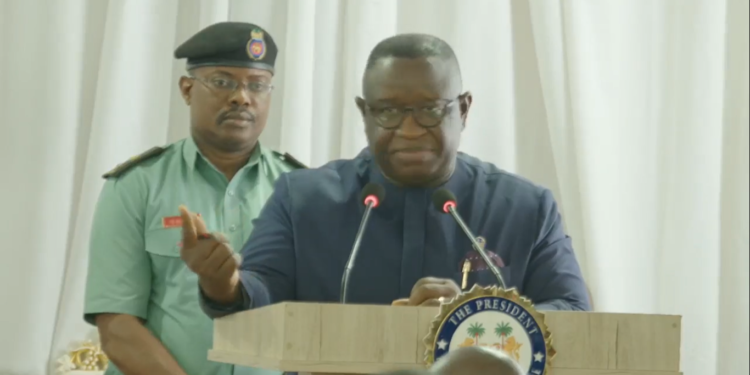President Julius Maada Bio on Tuesday lashed out at foreign agents who sought to interfere in Sierra Leone’s politics, saying that it’s not up to any international observer to validate the outcome of country’s elections.
Bio also said that neither he, nor the head of the Electoral Commission of Sierra Leone (ECSL) decides on how the outcome of elections are determined, noting that it’s all stipulated in the country’s constitution.
The Sierra Leonean leader made the comments as he addressed a group of civil society representatives who called on him at State House in Freetown. It’s part of an ongoing consultations with key interest groups, following his declaration as winner of the June 24 presidential elections.
While some local and regional observers declared the poll free and fair, western observers have been critical at the way the ECSL handled the results tabulation process.
The European Union Elections Observation Mission (EU EOM) has been particularly vocal about the issue, repeatedly calling out the ECSL for allegedly demonstrating lack of transparency in the counting process.
Similar concerns were shared by representatives of the US, UK, France, Germany, and Ireland governments, as expressed in a joint statement issued in the aftermath of the voting.
According to President Bio, the conduct of these agents exposed Sierra Leone to a state of confusion, something he said the nation must guard against.
“…we have to guard against that, because you have no right to come and validate our election,” he said.
“We have never done that to the European Union or any country in the European Union. We didn’t do that to the United States when they had their problem, when they attacked their Capitol…,” he added, in reference to the infamous January 6th attack on the seat of the US Congress by supporters of former President Donald Trump, following his election defeat, in a failed attempt to overturn the outcome of the 2020 elections.
“We didn’t say their democracy was being attained with guns…,” Bio said.
According to ECSL figures, President Bio won the presidency with 56.17 percent of the vote casts, narrowly beating his main challenger Dr Samura Kamara, who has rejected the results, claiming that it’s the outcome of a rigged process.
Like the western observers, Kamara’s party – the main opposition All People’s Congress (APC), cited lack of transparency in the result tabulation process. They have called for a re-run of the election, failure of which they have vowed not to participate in the governance process of the country.
President Bio though insisted that the appropriate procedure was followed to reach the conclusion of the elections.
“We should stand our grounds and correct certain misrepresentation and tell them (international community) that it is the constitution that determines how results are counted here, not the chairman,” he said.
Bio also said that he couldn’t bring himself to contradict the constitution “because somebody comes from somewhere to monitor or observe and say this is not how we should do it.”
In the last one week since his declaration as winner of the polls, Bio has held meetings with several groups, including tribal heads, religious leaders and farmers.
The group which met him on Tuesday was described as a representation of civil society movements from all five regions of the country.
During the over 40 minutes long meeting, Bio spoke at length about the critical role civil society plays in promoting the democratic process.
“We are bound to have our difference because by the nature of your job, you are sometimes critical, sometimes overcritical. But it’s part of democracy. We have to find a middle ground because we have Sierra Leone in our mind,” he said.
Bio also sought to justify his election victory, saying that he worked hard for it by going out to campaign to the voters.
“We had a spirited campaign. As a government, we went all over the country. We didn’t take anything for granted. We didn’t take the people for granted and we also used the campaign as a tool and means by which we can know the living condition of the people,” he said.
Bio stressed that his acceptance of civil society’s role as partners in the democratic process was based on the fact that he’s never been afraid of criticism, because he knew he’s human being and therefore prone to making mistakes.
He went on to speak about his government’s achievements during his first term of office, citing the reduction of maternal mortality by 60 percent within the period, increasing access to energy from about 17 percent to over 35 percent, and increasing the life expectancy of Sierra Leoneans from 53 to 61 years.
He said through these efforts Sierra Leone earned its respect and admiration from the international community.
“But you still have people who want to bring about confusion from the same international community and we must guard against that,” he said. He warned that the people who do this, come for their own interest, rather than the interest of anyone else.






















